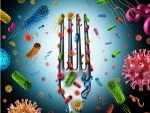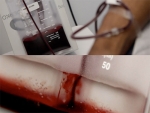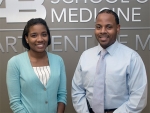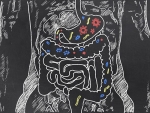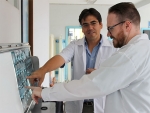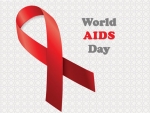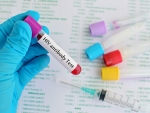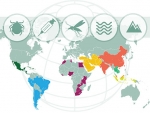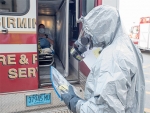Displaying items by tag: division of infectious diseases
Infectious diseases professor at UAB will collaborate with researchers, policy experts and clinicians from across the country to provide nonpartisan, evidence-based guidance.
Tagged under
 A UAB Infectious Diseases physician discusses bacteria found in food-borne illnesses and why you should wash your hands.
A UAB Infectious Diseases physician discusses bacteria found in food-borne illnesses and why you should wash your hands.
Leaders in HIV research and treatment gather at UAB to address laws that prohibit gay men from donating blood.
Tagged under
A program that supports historically disadvantaged health professionals chooses two researchers in the UAB Department of Medicine as finalists.
Tagged under
UAB partners with state agencies and organizations to aggressively decrease the spread of HIV/AIDS to the point of elimination of the spread of AIDS by 2030.
Tagged under
This is the first demonstration of donor microbes persisting in the recipient following fecal transplant, a finding made possible by a novel method to “fingerprint” individual strains of bacteria.
Tagged under
- release
- school of medicine
- center for clinical and translational science
- department of microbiology
- department of cell developmental and integrative biology
- department of medicine
- division of infectious diseases
- department of biostatistics
- school of public health
- department of genetics
- heflin center for genomic science
Vaccines are scientifically proven to save lives and prevent major outbreaks of highly infectious diseases among large populations in a safe and effective way.
Tagged under
Investigators will have a state-of-the-art space to conduct safe and age-appropriate clinical research to advance the science and treatment of childhood diseases.
Tagged under
UAB researchers develop a conceptual framework to help progress the care of people living with HIV by looking at ways to pursue better engagement in care.
Tagged under
A groundbreaking clinical research trial at UAB’s Alabama Vaccine Research Clinic to compare injectable PrEP versus a daily oral regimen for HIV prevention is now recruiting participants.
Tagged under
Tagged under
Tagged under
Scientists from around the world will gather at UAB in December to focus on HIV research and women, particularly collaborative research on women living with HIV and those at risk.
Tagged under
Antibody VRC01 proves safe for individuals infected with HIV-1 but only modestly controls the virus in participants who stop receiving antiretroviral therapy.
Tagged under
A UAB expert recommends international travelers consult with a physician four to six weeks prior to travel and learn medical risks and how to prevent illness while abroad.
High mosquito and human population densities, combined with mosquito breeding conditions, are the central cause for Zika virus.
Tagged under
A UAB physician provides information on risks, recommendations and effects of Zika virus for pregnant women.
Tagged under
UAB has received a grant to develop and implement Ebola and infectious disease training to further protect health care and public safety workers.
Tagged under
Researchers from UAB, Emory and Microsoft demonstrate that HIV has evolved to be pre-adapted to the immune response, worsening clinical outcomes in newly infected patients.
Tagged under
Antibiotic use in acute and long-term care facilities is a focus of UAB’s antibiotic stewardship program.
Tagged under

